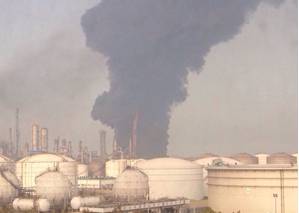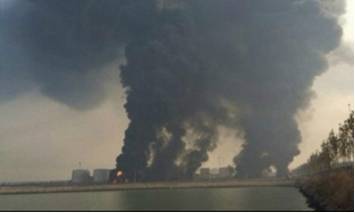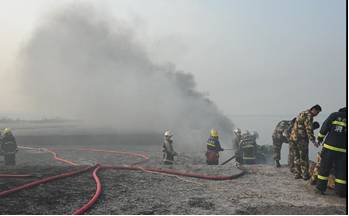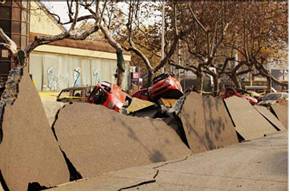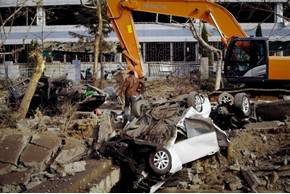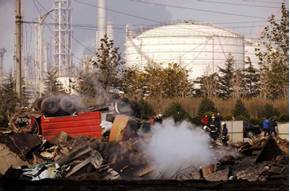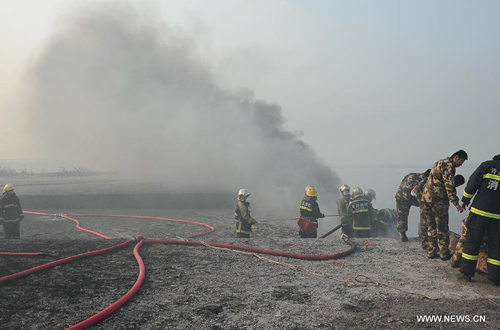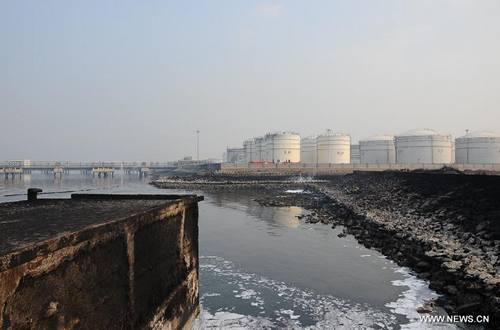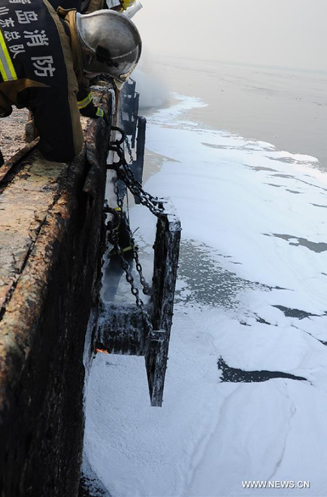
Incident Report Subject: China - Qingdao Oil Pipeline Blast Kills 22 Date of Email report: Fri 22/11/2013 Report Detail:
At least 22 people were killed after a leaking pipeline caught fire and exploded on Friday morning in the coastal city of Qingdao, in east China's Shandong Province, local authorities said. The number of injured people have not yet been confirmed. They are being treated in local hospitals. The accident happened around 10:30 a.m. in Huangdao District when workers were repairing the petroleum pipeline, which began leaking oil at around 3 a.m., according to the Qingdao government's publicity office. Oil flow through the pipeline was shut down at about 3:15 a.m.. The fire has been put out, and barricades have been set up to stop the oil from entering the sea, according to a comment posted on Friday afternoon on the official microblog of the Qingdao municipal environmental protection bureau on Sina Weibo, China's Twitter-like microblogging service. The 176-km pipeline, which links oil depots in Huangdao to Weifang City, home to a few petrochemical plants, is owned by Sinopec, China's largest oil refiner. Pieces of cement and debris were scattered around the explosion site, which is close to the coast. An oil belt with a length of two to three meters could be seen in waters around the explosion spot as of 2:40 p.m. No new oil leakage from the pipeline had been found, according to a Xinhua reporter at the scene. While sources with the city's maritime safety administration told Xinhua that they had not received any report on blast-related pollution in the sea so far, they have strengthened patrolling around the coastal areas close to the blast site. Rescue work continues. The cause of the accident is being investigated. Photographs posted on Sina Weibo showed the blast caused a large trench in the ground and that car windows nearby were cracked. Environmental monitoring showed that the concentration of toxic materials in the air is under the national standard. The local government has told citizens to stay calm. Huangdao District is connected with the city proper by the Qingdao Jiaozhou Bay Bridge. Xinhua reporters said the exit on the bridge leading to Huangdao has been temporarily closed and only emergency vehicles are allowed to enter. Local traffic authorities have told drivers to allow rescue vehicles to pass. Subject: Update – China Company Sorry for Oil Blasts that Kill 47 and Injures 136 Date of Email report: Sat 23/11/2013 Report Detail:
Appears oil and hydrocarbon vapour spread to utilities, drains and service pipeline trenches - causing confinement explosion on ignition China's largest oil refiner Sinopec on Saturday apologized for explosions from a ruptured oil pipeline that killed 47 people and injured 136 others in one of the country's worst industrial accidents this year. Sinopec's expansion of petrochemical projects has met with resistance from members of the public, and Friday's blasts in the eastern port city of Quingdao will likely add to growing concern about safety and environmental risks. The accident was the deadliest involving Sinopec. The explosions ripped slabs of pavement and online photos showed bodies, overturned vehicles and shattered windows in nearby buildings. Black smoke rose above gigantic fuel silos and darkened much of the sky over a bay area. The pipeline, owned by Sinopec, ruptured and leaked for about 15 minutes onto a street and into the sea before it was shut off. Hours later, as workers cleaned up the spill, the oil caught fire and exploded in two locations, the city government said. Fu Chengyu, chairman of Sinopec, issued a public apology Saturday morning, according to a company statement. He said that Sinopec will collaborate with a State Council investigation group. "We will investigate the incident with responsibility and give timely reports," another Sinopec statement said The Qingdao Environmental Protection Bureau said barriers had been set up to contain the oil as it spread into the sea, but that a mixture of gas and oil from a storm sewer exploded and caught fire over the sea. More than 3,000 square meters (32,000 square feet) of sea surface was contaminated, the city government said. Authorities said the oil had seeped into underground utility pipes, which could have been a factor in the blasts, but they did not elaborate. They assured the public that the explosions did not affect any petrochemical plant or military facilities in the seaside district and that air quality remained good after the disaster. About 18,000 residents have been evacuated in the wake of the blasts, and power was restored to all except two residential neighborhoods, authorities said. Of the 136 people hospitalized, 10 remained in critical condition, the city government said. The Beijing News cited a resident surnamed Gao, who works in logistics, as saying he was driving past Qingdao's Huangdao district when he felt the force of the blasts, and then realized the ground in front of him had fractured. The air was pungent, many cars on both sides of the road were overturned and there was dark smoke rising in the distance, he said. "It felt like an earthquake, and I was dumbstruck," Gao said, adding that there was chaos on the street as people ran, panicking, in all directions. Authorities ruled out terrorism but the incident remained under investigation, it said. President Xi Jinping urged local officials to go all out in finding missing people, treating the injured and finding the cause of the accident, state TV broadcaster CCTV said. Additional Documentation:
|

